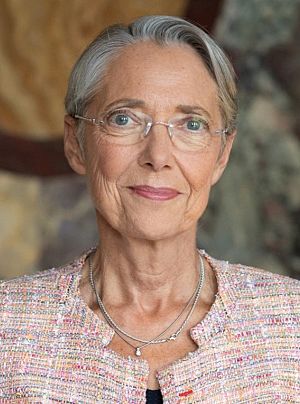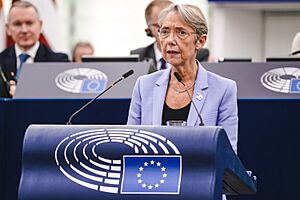Élisabeth Borne facts for kids
Quick facts for kids
Élisabeth Borne
|
|
|---|---|

Borne in 2022
|
|
| Minister of State Minister of National Education, Higher Education and Research |
|
| Assumed office 23 December 2024 |
|
| Prime Minister | François Bayrou |
| Preceded by | Anne Genetet (National Education) Patrick Hetzel (Higher Education and Research) |
| Member of the National Assembly for Calvados's 6th constituency |
|
| In office 10 February 2024 – 23 January 2025 |
|
| Preceded by | Freddy Sertin |
| Succeeded by | Freddy Sertin |
| In office 22 June 2022 – 22 July 2022 |
|
| Preceded by | Alain Tourret |
| Succeeded by | Freddy Sertin |
| Prime Minister of France | |
| In office 16 May 2022 – 9 January 2024 |
|
| President | Emmanuel Macron |
| Preceded by | Jean Castex |
| Succeeded by | Gabriel Attal |
| Minister of Labour, Employment and Integration | |
| In office 6 July 2020 – 16 May 2022 |
|
| Prime Minister | Jean Castex |
| Preceded by | Muriel Pénicaud |
| Succeeded by | Olivier Dussopt |
| Minister of Ecological and Inclusive Transition | |
| In office 16 July 2019 – 6 July 2020 |
|
| Prime Minister | Édouard Philippe |
| Preceded by | François de Rugy |
| Succeeded by | Barbara Pompili |
| President of RATP | |
| In office 21 May 2015 – 17 May 2017 |
|
| Preceded by | Pierre Mongin |
| Succeeded by | Catherine Guillouard |
| Prefect of Vienne | |
| In office 1 February 2013 – 23 April 2014 |
|
| Preceded by | Yves Dassonville |
| Succeeded by | Christiane Barret |
| Personal details | |
| Born |
Élisabeth Borne
18 April 1961 Paris, France |
| Political party | Renaissance (2017–present) |
| Other political affiliations |
Territories of Progress (2020–2022) |
| Spouse |
Olivier Allix
(m. 1989; div. 2008) |
| Children | 1 |
| Education | École Polytechnique École des ponts ParisTech Collège des Ingénieurs |
| Signature | |
Élisabeth Borne (born 18 April 1961) is a French politician. She was the Prime Minister of France from May 2022 to January 2024. She was the second woman ever to hold this important job in France.
Since December 2024, she has been the Minister of National Education, Higher Education and Research in the Bayrou government. She is a member of President Emmanuel Macron's political party, Renaissance.
Before becoming Prime Minister, Borne worked as a civil engineer and managed state-owned companies. She also served as a minister for transport (2017–2019), ecology (2019–2020), and labour (2020–2022).
As Prime Minister, Élisabeth Borne led the government through several big changes. These included a new law about retirement age and managing the country's finances during a time of rising costs. She resigned in January 2024 and returned to her role as a Member of Parliament. In December 2024, she joined the government again as a minister.
Contents
Early Life and Education
Élisabeth Borne was born in Paris, France. Her mother, Marguerite Lecèsne, was a pharmacist. Her father, Joseph Bornstein, was born in Belgium. He came to France during the Second World War and was part of the French Resistance.
Joseph Bornstein was arrested in 1943 and sent to a concentration camp. He survived and later wrote about his experiences. After the war, he became a French citizen and changed the family name to "Borne."
Élisabeth's father passed away when she was 11 years old. Because of this, she received special education support from the state called "Ward of the Nation" benefits. This helped children who lost a parent due to the war or other special circumstances.
Borne went to high school in Paris. She then studied engineering at the École Polytechnique and the École des ponts ParisTech. She also earned a business degree from the Collège des Ingénieurs.
Career in Public Service
Élisabeth Borne started her career in public service in 1987. She worked for the French ministry that deals with public works and planning. In the early 1990s, she was an advisor in the Ministry of Education.
She later worked for a public housing company and then for the state-owned railway company SNCF. From 2008 to 2013, she was the director of urban planning for the City of Paris.
In 2013, Borne became the Prefect of the Vienne region. This was a very important role, and she was the first woman to hold it. From 2015 to 2017, she was the CEO of RATP Group. This is a company that runs public transport in Paris.
Political Career
For a long time, Élisabeth Borne was connected to the Socialist Party. However, she officially joined La République En Marche! (now called Renaissance) after Emmanuel Macron became president in 2017.
Minister for Transport (2017–2019)
From May 2017 to July 2019, Borne was the minister in charge of transport. During this time, she worked on reforms for the SNCF railway workers' pension system.
Minister of Ecological and Inclusive Transition (2019–2020)
In 2019, Borne became the minister for ecology. In this role, she helped create laws to improve energy planning and promote clean transportation in France. The goal was to make the transport sector carbon neutral by 2050.
Minister of Labour (2020–2022)
In July 2020, Borne was appointed minister of labour. She worked on changes to unemployment benefits. During her time as minister, France saw its unemployment rate drop to a very low level.
Prime Minister (2022–2024)
On 16 May 2022, Élisabeth Borne was appointed Prime Minister of France. She took over after Jean Castex resigned. She was the second woman in France's history to become Prime Minister.
Borne ran for election in the 2022 French legislative election in the Calvados's 6th constituency in Normandy. She won her seat in Parliament. After the election, she offered to resign as Prime Minister, but President Macron asked her to stay and form a new government.
As Prime Minister, Borne's government faced challenges. They passed a new law that changed the retirement age from 62 to 64. She also led the government's efforts to help people with the rising cost of living. In January 2024, she resigned as Prime Minister at President Macron's request.
Member of Parliament and Minister of National Education (2024–Present)
After leaving the Prime Minister's office, Borne returned to her role as a Member of Parliament for her constituency in Calvados. She officially started her duties as an MP in February 2024. She serves on the Committee on Foreign Affairs in Parliament.
In June 2024, President Macron called for new elections. Borne ran again for her seat in Calvados and was re-elected. In August 2024, she announced she would run for the leadership of her party, Renaissance.
In December 2024, Élisabeth Borne was named the Minister of National Education, Higher Education, and Research in the new Bayrou government.
Personal Life
Élisabeth Borne married Olivier Allix in 1989. They later divorced but have one son, Nathan.
In March 2021, she was hospitalized with COVID-19 and needed oxygen.
Borne is of Jewish background.
Honours
Élisabeth Borne has received several important honours for her service:
| Ribbon bar | Honour | Date and comment |
|---|---|---|
| Chevalier of the Legion of Honour | 12 July 2013 | |
| Grand Cross of the National Order of Merit | 22 December 2022 | |
| Officer of the National Order of Merit | 14 November 2016 | |
| Chevalier of the National Order of Merit | 6 November 2008 | |
| Commandeur of the National Order of Maritime Merit | 2019 |
See also
 In Spanish: Élisabeth Borne para niños
In Spanish: Élisabeth Borne para niños
- Borne government
 | Isaac Myers |
 | D. Hamilton Jackson |
 | A. Philip Randolph |



